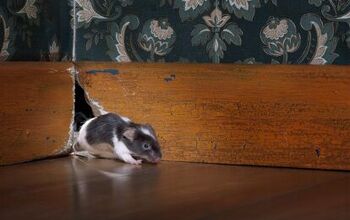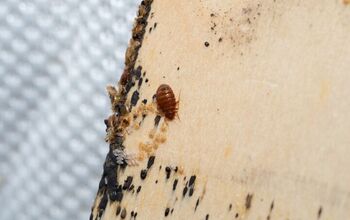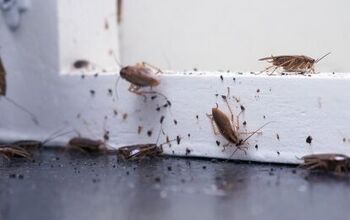What Do Mice Sound Like At Night? (Find Out Now!)

If you’ve ever heard the idiom ‘as quiet as a mouse,’ just know that this is a complete lie. Contrary to popular belief, mice are not in the least bit quiet. Though, while mice can be very noisy creatures, their sounds can be somewhat difficult to decipher.
For any homeowner that suspects they may have these pests inside their home, understanding what mice sound like at night can be incredibly helpful. Since mice tend to be the most vocal when they are in search of food, you’ll most likely hear them in the evening. At night, mice sound like noisy squeaking, scratching, and gnawing as they forage for food.
The presence of mice isn’t always obvious until it becomes a full-on infestation. So, the key to eliminating a mouse problem is to become aware of them as early as possible. Mice breed incredibly fast and in just a couple short months, your problem can grow exponentially. One of the best ways to detect a mice population is to keep your ears open for the strange sounds that they make – both at night and during the day.
Do You Need Pest Control Services?
Get free, zero-commitment quotes from pro contractors near you.

What Sounds Do Mice Make?
Like humans, mice make all sorts of sounds to communicate and express emotion. They also make noises associated with them moving throughout your home in search of a food supply. The following sounds are most commonly associated with mice, and other types of rodents as well:
- Scurrying
- Scratching
- Gnawing or chewing
- Squeaking or vocalization
If you notice any of these sounds in your home, there is a high chance that you have a rodent problem.
Scurrying
Scurrying is one of the most common sounds that you’ll hear coming from. As mice move around your home, they are known for making a light, soft scuffling noise. The sound is caused by their bodies rubbing against surfaces and their nails burrowing in to get a better grip.
Oftentimes, the first time that these scurrying noises are heard, people assume that the pest is much larger than a mouse. This is especially the case when heard at night, as our imaginations can get the best of us in the evening hours. You’ll be surprised to learn how loud mice can be and their sounds also tend to echo, which makes it seem like they have a bigger footprint.
Scratching
Scratching is another very common sound that mice make in the home. As mice crawl and climb along your floorboards, baseboards, drywall, and other common areas in homes, you will hear a scratching noise. As you might expect, this comes from their nails digging in to gain traction. Mice have an incredibly strong grip, which makes them exceptional climbers.
This means that they can easily make their way into your ceiling and attic. You’ll also hear scratching noises when mice are searching for nesting materials and their nests are commonly found in attics.
Gnawing
Over the course of a mouse’s life, their four incisors never stop growing. As a result, mice need to chew and gnaw constantly to keep their teeth the ideal size. For this reason, you’ll often hear noises like gnawing or chewing coming from within your walls or in your attic. This can be particularly concerning when you consider the average rodent population in an urban home.
If you hear gnawing, you are probably dealing with hundreds, if not thousands of these pests. Think about all of these mice chewing on your joists, supports, wires, etc. Over time, this can become a major safety concern and costly endeavor to fix.
Squeaking
Most are unaware that mice actually communicate to one another. To human ears, mouse talk sounds like squeaking. While it may be more likely to hear scratching and scurrying along your ceiling before you detect any squeaking, this is another major sign that you have a mouse problem. In general, squeaking is more common during mice mating season. Unfortunately, there is really no distinct season when they breed, as they can have litters all year round.
Mice vocalizations will also occur as means of communicating the location of food and shelter, as well as relaying emotions. This squeaking can shift frequency and pitch, based on what the mice are trying to communicate. For instance, the squeaks are typically louder when they locate food, and faster when mating.
What Do Mice Sound Like at Night?
More often than not, the time of day that you will hear mice is in the dead of night. Mice have nocturnal behaviors, usually lying low during the daytime and coming out at night to search for food and water and build their nests. They tend to be the most vocal around 30 minutes after sunset and until 30 minutes before sunrise.
Since it’s so quiet in the evening hours, the sounds that the mice make as you are lying in bed trying to go to sleep will be amplified. You’ll likely hear a combination of scurrying, scratching, and gnawing. Since the sounds are amplified, you may think that there is a much larger animal in your home, like a squirrel or raccoon.
One of the easiest ways to confirm if it is, in fact, mice in your home, is to make noise when you hear the sounds or tap on your walls. If the mouse sounds come to a halt, then, congrats, you do have a mouse problem.
What About Daytime Activity?
It is commonly misunderstood that mice are strictly nocturnal animals. On the contrary, they only have nocturnal behaviors, which means they are usually most active after dark. Mice can, and will, come out during the day, as well.
In most cases, they will only come out during the daytime if the food supply is scarce and they know that they must put their safety at risk to find more. Though, they may also be active during the day if a dominant mouse does not permit them to find mates or food at night.
Finally, a mouse may come out during the day if your home is quiet and it feels like it is safe enough to. It’s not uncommon to find a mouse while you’re silently reading a book in the middle of the day.
Other Signs You Have Mice
Although hearing some of these common mouse sounds is one of the early indicators of a rodent problem, it’s not the only one. Here are some other telltale signs to keep a look out for:
- Droppings: Mouse droppings are one of the most common signs of mice in your home. They are dark brown or black, usually between ¼ and ½ inch long, and shaped like a thin grain of rice or pellet. Mice tend to defecate in straight lines, so look for these patterns under your furniture, and around wall corners and baseboarding. The more droppings you have, the more mice there likely are.
- Gnaw marks: In addition to gnawing sounds, you may also find gnaw marks on a variety of materials. Mice usually gnaw on soft materials in the evening including paper, cloth, wood, fabric, cardboard, insulation, and even wires.
- Foul odors: A mouse infestation has a distinctive, musty ammonia-like odor, which comes from their urine. The odor may be more evident in enclosed areas, like cabinets, pantries, and drawers, as well as along walls, baseboards, and anywhere else where the mice frequently travel.
- Disappearing food: A single adult mouse has the ability to consume between three and four grams of food a day. Mice love much of the same foods that we do, including cereal, fruit, candy, seeds, grains, nuts, chocolate, meat, and especially food high in fat content like butter and cheese. Tears in packaging or odd holes are all signs that a mouse (or two) may be snacking in your pantry.
- Nesting or tunneling: Mice will create tunnels in your insulation as a way to travel throughout your house. They will also nest in isolated locations. So, if you have access to your attic, give it a quick inspection and you’ll most likely find evidence that mice have been there.
Aside from your attic, kitchens, crawl spaces, basements, and garages are other common places that you might find mice. Though, in most cases, the kitchen is where they’ll find a food source, and then they’ll retreat to more remote locations in the home.
Do You Need Pest Control Services?
Get free, zero-commitment quotes from pro contractors near you.

Final Thoughts
Squeaking, scurrying, gnawing, and scratching are just a few of the sounds that you may hear if you have mice in your home. Though possible, it is rare to hear them in the daylight hours. Instead, you’ll usually hear these noises in the dead of night, when the house is quiet and sounds are amplified.
The key to getting rid of an existing mouse problem is early detection. With that said, knowing what mice sound like can be incredibly beneficial. Then, once the problem is addressed, you can prevent mice from ever even entering your home by making it less appealing. Block off entry points, keep your home clean, and reduce their food and water sources.

Jessica considers herself a home improvement and design enthusiast. She grew up surrounded by constant home improvement projects and owes most of what she knows to helping her dad renovate her childhood home. Being a Los Angeles resident, Jessica spends a lot of her time looking for her next DIY project and sharing her love for home design.
More by Jessica Stone



























